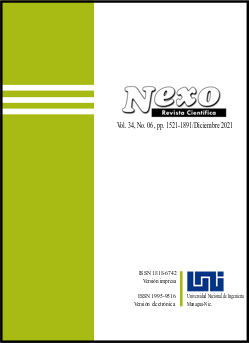Thermal studies of vacuum panels of cellular structure of a passenger car
DOI:
https://doi.org/10.5377/nexo.v34i06.13133Keywords:
Passenger railway car, Thermal resistance, Vacuum panelAbstract
Aluminum alloys and composite materials are used in the body structures of modern passenger railway cars, which required the use of new manufacturing technologies: extrusion, pultrusion, etc. The use of new materials and new production technologies is changing the design requirements of passenger rail cars. The use of computer-aided design systems, in particular, SolidWorks Simulation, allows you to optimize the profile of cellular panels used in the construction of the body of a passenger railway car and obtained by extrusion or 3-D printing. Purpose of this work is to optimize the design stage of the enclosing structures of the body of a passenger railway car made of cellular profile panels, which can significantly reduce the heat transfer coefficient of the body walls and their mass, as well as provide the necessary strength conditions. Optimal profile of the vacuum panel, consisting of two rows of hexagonal cells, provides, according to calculations, the value of the specific thermal resistance R = 2.922 (m2 K)/W, which is 16.5% more than that of the existing body structure of a passenger rail car.
Downloads
1049
Downloads
Published
How to Cite
Issue
Section
License
Copyright (c) 2021 Universidad Nacional de Ingeniería

This work is licensed under a Creative Commons Attribution 4.0 International License.
The authors who publish in Nexo Scientific Journal agree to the following terms:
- Authors retain the copyright and grant the journal the right of the first publication under the license Creative Commons Attribution License, which allows others to share the work with a recognition of the authorship of the work and the initial publication in Nexo Scientific Journal.
- Authors may separately establish additional agreements for the non-exclusive distribution of the version of the work published in the journal (for example, in an institutional repository or a book), with the recognition of the initial publication in Nexo Scientific Journal.
- Authors are allowed and encouraged to disseminate their works electronically (for example, in institutional repositories or in their own website) before and during the submission process, as it can lead to productive exchanges, as well as earlier and greater citation of published works.










